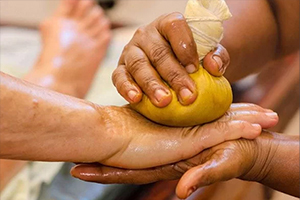How To Treat Osteo Arthritis Through Ayurveda?
Osteoarthritis, a degenerative joint condition, affects countless individuals around the world, leading to discomfort, stiffness, and limited mobility. While conventional treatments like pain medications and physical therapy offer relief, Ayurveda, an ancient holistic healing system from India, presents an alternative approach to managing osteoarthritis. In this article, we will explore how Ayurveda offers unique insights and remedies for treating osteoarthritis.

Understanding Osteoarthritis
Osteoarthritis occurs when the protective cartilage that cushions the ends of bones within the joints deteriorates over time. As the cartilage wears away, bones may begin to rub against each other, resulting in pain, inflammation, and reduced joint function. Commonly affecting weight-bearing joints like knees, hips, and spine, osteoarthritis is often considered a natural consequence of aging and joint wear and tear.
Ayurveda Treatment for Osteoarthritis
Ayurveda, rooted in ancient wisdom, views health as a harmonious balance between the body, mind, and spirit. Ayurvedic treatment for osteoarthritis focuses on restoring this balance and alleviating symptoms through a combination of natural remedies, lifestyle adjustments, and personalized recommendations.
Key Aspects of Ayurveda for Treating Osteoarthritis:
Dosha Assessment: In Ayurveda, individuals are classified into three doshas—Vata, Pitta, and Kapha—which represent different energetic constitutions. A personalized approach to treatment considers an individual’s dominant dosha and tailors remedies accordingly.
Dietary Modifications: Ayurveda emphasizes the importance of proper nutrition in maintaining health. A diet rich in anti-inflammatory foods, such as fresh fruits, vegetables, whole grains, and herbal teas, can help manage inflammation associated with osteoarthritis.
Herbal Remedies: Ayurveda employs a variety of herbal formulations to reduce pain and inflammation, improve joint lubrication, and support cartilage health. Common herbs used include turmeric, ginger, boswellia, and guggulu.
Lifestyle Adjustments: Practicing gentle exercises, such as yoga and Tai Chi, can improve joint flexibility and strengthen supporting muscles. Ayurveda also encourages mindfulness practices like meditation to manage stress, which can exacerbate osteoarthritis symptoms.
Panchakarma: This traditional Ayurvedic detoxification process involves therapeutic procedures like massage, steam therapy, and oil treatments. Panchakarma aims to remove toxins from the body and restore balance, potentially providing relief from osteoarthritis symptoms.
Benefits of Ayurveda for Treating Osteoarthritis:
Holistic Approach: Ayurveda considers the interconnectedness of the body, mind, and spirit. By addressing imbalances on multiple levels, Ayurvedic treatments can provide comprehensive relief and improve overall well-being.
Personalization: One of Ayurveda’s strengths lies in its individualized approach. By identifying a person’s dosha and specific symptoms, Ayurvedic practitioners tailor treatments to suit their unique needs.
Natural Remedies: Ayurveda relies on natural substances, such as herbs and dietary adjustments, to promote healing. This aligns with individuals seeking holistic, nature-based alternatives to conventional medications.
Prevention and Maintenance: Ayurveda doesn’t just target the immediate symptoms but also focuses on preventing future health issues. This preventive approach can lead to better joint health and reduced osteoarthritis progression.
Conclusion
Star Ayurveda presents a holistic and individualized approach to managing osteoarthritis that resonates with those seeking natural solutions. While Ayurveda offers promising strategies, it’s essential to remember that results can vary from person to person. Consulting with experienced Ayurvedic practitioners is crucial to ensure safe and effective treatment, especially if you’re considering incorporating Ayurveda into your osteoarthritis management plan.
As you embark on this journey, consider your preferences, health history, and any ongoing treatments. Integrating the principles of Ayurveda alongside conventional medical advice could provide a well-rounded strategy for managing osteoarthritis, enhancing your joint health, and ultimately improving your overall quality of life.